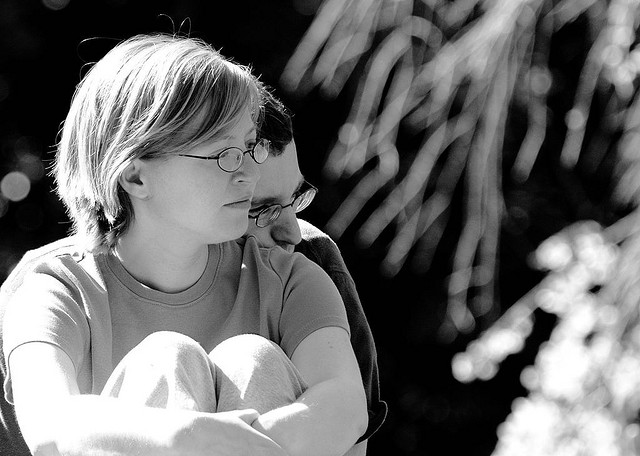What immobilizes us from moving on from a relationship, in which we clearly have no chance of getting our needs met?
Why do we insist on staying and perhaps blaming the other person, or extenuating circumstances in hopes that either will shift?
The fear of change.
We need to learn to trust that discomfort is a good thing when it comes to change and that even if we take a step toward it and then want to run back to the safety of the known ‘ick‘ it’s our natural tendency.
It doesn’t mean we are weak or more flawed then the rest, it’s how our subconscious has been wired and our known as abysmal as it might feel, also feels undone if we take on change too quickly.
It takes self-awareness to understand ourselves when leaving a relationship; the other person isn’t the problem. We are our own problem. If we do not take on that responsibility, we will shape another relationship to feel just like the one we are dying to climb out of now.
I have clients who find themselves in all sorts of relationship disarray, places they never imagined their reality. The heaviness of feeling imprisoned, as if all choice has been wiped from their existence and this decision to suffer, sacrifice and remain in a state of daily punishment is in itself, a choice.
We can tell ourselves excuses.
We can tell stories of our inherent bravery in staying somewhere that feels heavy upon waking each day and that we shut out with our sleep every night.
We can continue down the road of holding the reins so tightly, in which nothing will change and then complain about it, ignoring that our need to control keeps us here.
We will place all sorts of meaningless events as having way more importance in our lives, rather than really taking ourselves in hand and staring down the barrel of our unhappiness.
We say for our future, we have a much bigger plan at hand, as though our life is a movie and somehow everything around us will play in cooperation with this strategy.
What happens when we take responsibility for ourselves?
There’s no more stories to tell of woe; no more sympathy to begot; there’s no one left to blame and there is only a choice of taking action for ourselves.
Does this mean we have to jump up and leave immediately?
Unless we’re emotionally connected to what we’re doing, taking extreme action isn’t recommended.
First, we need to do a reality check.
Why are we really still here? This is usually where we find the hope of being rescued. Either saved by our partner or all of a sudden, magically, they change and voila! Our lives are that fairy tale we’ve always wanted.
Hope can be a good thing, let’s say when something tragic is happening. But, when it comes to the fantasy of fulfilling that empty place inside of ourselves, or receiving validation we rarely or never got or finally being loved by someone in that way where we feel safe; the attachment can keep us there for years.
Second, another reality check.
What beliefs do we hold about ourselves that makes us feel that life is lacking?
This is about our belief that we’re not enough, life is not enough…there’s not enough money, time, love, good mates, etc. We may think we’re doing the wrong thing, because our parents did the opposite. Or we may want to rebel. The problem is in comparing our lives to our parents, it’s out of context. And when it comes to scarcity, as long as we believe in not enough in any part of life, we’ll remain right where we are.
Third, another reality check.
Where do we receive validation? Is it because we mow the lawn and feel we deserve a pat on the head?
Perhaps, we do nice things to get something and we keep trying and trying and the other person just doesn’t appreciate us. Sometimes we’ll stay for years waiting for that magic moment when they wake up, roll over and tell us how wonderful we really are…and maybe that fantasy does come true? And that feeling lasts a day or a week, but eventually it wears off.
Self-validation is the only thing with the capacity to last. When we get real about staying to receive some form of validation, we can look at taking action for ourselves.
Fourth, action is necessary for boundaries to actually work.
Allow the identity we’ve built, if it’s inauthentic to be demolished. It’s okay if we end up proving our partner right. So what? When we state how we want to live and take action to live that way, all outer resistance is out of our control anyway. So often we’ve given ourselves up, because we’re afraid to be who we are lest we fail or prove someone right. When we stand for ourselves and not against someone as our focus, our whole life can change and that is scary, but then so is the alternative to keep living in this self-made prison.
Fifth, allow the resistance within to just be.
Seeing it, admitting to it, but not battling our own resistance to change will get us to the other side of making decisions, taking action and staying with the discomfort that is inevitable in staking out a new direction. Changing patterns and beliefs is never easy, so welcome the uncomfortable and watch the heaviness dwindle. Remember, our subconscious is resisting what is new, because it only knows where it has been and it resists to hold onto those patterns. If we don’t battle ourselves and continue taking action, we will create new patterns that in time will be more comfortable.
Sixth, love.
I mention it, because it’s a given. Loving ourselves gives us the capacity to authentically love others. Leaving a relationship through love is a better platform, because it is done honestly and kindly. Leaving a relationship believing there’s the absence of love, means it is just buried beneath anger, numbness or whatever we’ve thrown on top of it.
Find the love and let it lead.
Relephant:
9 Signs A “Bad Relationship” Cycle is Ending.
Author: Tracy Crossley
Editor: Renée Picard
Image: mricon at Flickr


 Share on bsky
Share on bsky





Read 0 comments and reply